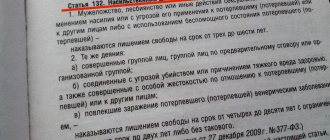Marina Aksenova Lawyer, website author
Expert commentary
Sexual violence against both women and men, qualified under parts 1 and 2 of Article 132 of the Criminal Code of the Russian Federation, is punishable by imprisonment for a term of 12 to 20 years with restriction of freedom for up to 2 years with deprivation of the right to hold a certain position or engage in certain activities for a period up to 20 years, or without deprivation, if it:
- caused the death of the victim (due to negligence);
- committed against a person under 14 years of age.
According to Part 5 of Article 132 of the Criminal Code of the Russian Federation, for acts provided for in Parts 1 and 2 of this article, committed against persons under 14 years of age, they face:
- imprisonment from 15 to 20 years with deprivation of the right to hold certain positions or engage in certain activities for up to 20 years;
- or life imprisonment.
But only if, during the investigation of a crime against sexual integrity, it becomes clear that the accused has already been prosecuted for crimes committed against a minor, listed in Chapter 18 of the Criminal Code of the Russian Federation.
Crimes against sexual integrity of minors
In Russia there is a fairly large number of children who have survived sexual violence. According to statistics, every fourth victim is a child. In addition, the issue of sexual violence in the family is acute in the country.
Due to the fact that children are more vulnerable in this case, penalties for sexual assault against minors were tightened in 2012. The maximum penalty for violating the sexual integrity of a child under 14 years of age is imprisonment for 20 years. In addition, it is impossible to obtain a suspended sentence in this case.
In 2021, a bill was introduced to the State Duma, which proposes to toughen the punishment for sexual assault against a minor even more. The creators of this project want to make changes to Part 5 of Article 132. They plan to increase the age of the child to 18 years if the accused commits a crime against a minor under Chapter 18 of the Criminal Code of the Russian Federation repeatedly. In addition, they propose to leave only one punishment - life imprisonment.
A FEW WORDS ABOUT DISTINGUISHING RAPE FROM VIOLENT ACTS OF A SEXUAL NATURE
Currently, in practice, questions arise regarding the delimitation of rape, the liability for which is provided for in Art. 131 of the Criminal Code of the Russian Federation against violent acts of a sexual nature, liability for the commission of which is provided for in Art. 132 of the Criminal Code of the Russian Federation. Violent acts of a sexual nature are a relatively new crime for the Criminal Code of the Russian Federation; previously such formulation was not used by the legislator, which in the Criminal Code of the RSFSR of 1960 partially corresponded to sodomy (Article 121 of the Criminal Code of the RSFSR), as well as (indirectly or by analogy) rape (Article 117 of the Criminal Code of the RSFSR) with perverted forms of satisfying sexual passion and intentional infliction of bodily harm (Articles 108, 109, 112) or hooliganism (Article 206) when a woman uses violence against a man or another woman. The establishment of a direct criminal law ban on the commission of these actions allowed the legislator to ensure comprehensive protection of the sexual integrity and sexual freedom of any person - both women and men. But at the same time, problems arose in distinguishing between these crimes. In order to differentiate these acts from each other, it is necessary to determine their characteristics and content.
And so Chapter 18 of the Criminal Code of the Russian Federation contains a criminal law prohibition on committing a number of acts against sexual integrity and sexual freedom of the individual. And if sexual integrity presupposes a ban on committing any sexual acts against a person, then sexual freedom is the right to independently decide how and with whom to satisfy one’s sexual desires. Art. 132 of the Criminal Code protects the “perverted way” of sexual relations in its traditional Soviet understanding. This norm, based on the letter of the current criminal legislation, protects the same social relations and interests that are protected by the norm on liability for rape. However, if in rape we are talking only about the sexual freedom and integrity of a woman, then when committing violent acts of a sexual nature we need to talk about causing harm to the sexual freedom and sexual integrity of any person. At the same time, the criteria and boundaries of the admissibility of one’s own sexual freedom must undoubtedly be determined by the victim - he and only he must determine whether his sexual freedom suffers as a result of the act committed against him.63
Violent acts of a sexual nature (Article 132 of the Criminal Code) should be understood as sexual intercourse between a man and a woman, sodomy - between men, and lesbianism - sexual contacts between women. Other actions of a sexual nature should be understood as satisfying sexual needs in other ways, including a woman forcing a man to perform sexual intercourse through the use of violence or the threat of its use.
Sodomy (male homosexuality) is understood as satisfying sexual desire between men by introducing the active partner’s penis into the anus (anus) of the passive partner. Other forms of homosexual acts between men are not sodomy, but refer to other acts of a sexual nature. Only men can be victims of sodomy.
Lesbianism (female homosexuality) is a form of satisfaction of sexual desire by a woman in relation to another woman through various actions of a sexual nature (imitation of sexual intercourse, contact of genitals and other parts of the body, etc.). Only a woman can be a victim of lesbianism.
Other actions of a sexual nature are any means of satisfying sexual desire between men or between a man and a woman, with the exception of natural sexual intercourse, sodomy and lesbianism. This could be, for example, oral sex, anal sex, intercourse between a man and a woman in a natural form if the coercion comes from the woman. Other actions of a sexual nature must be of the nature of sexual penetration, which should be understood as the introduction of both the penis and other objects into the natural cavities of another person for the purpose of obtaining sexual gratification. Victims can be both men and women (depending on the nature of the act)64. When committing this crime, violence or the threat of its use is used, or the helpless state of the victim is used.
16 Nurkaeva T., “Russian justice” Crimes against freedom and personal integrity, No. 8, August 2013. pp. 35-50
Comparative analysis of Art. Art. 132 and 131 of the Criminal Code of the Russian Federation allows us to conclude that the elements of crime provided for in them are related to each other as general (violent acts of a sexual nature) and special (rape). Their elements and characteristics coincide completely or partially. Being identical with rape on the subjective side, qualifying and especially qualifying features, the composition of violent acts of a sexual nature from the point of view of the object, the objective side and the subject is clearly wider in scope and content65.
In contrast to rape, the main object of violent acts of a sexual nature is the sexual freedom and sexual integrity of any person, regardless of his gender. Sexual freedom and sexual integrity of the individual, being attributes of the normal way of life in the sphere of sexual relations established in society and based on morality, are closely related, but are not identical to each other.
Sexual freedom is the right of an adult, i.e. an adult, or, in any case, who has reached the age of 16, can independently decide issues related to the choice of a sexual partner and the form of satisfying their intimate needs. For this category of persons, sexual integrity means a prohibition based on the law to enter into sexual relations with them in addition to or contrary to their will and desire.
For younger minors (persons aged 14 to 16 years) and minors (persons under 14 years of age), sexual integrity is a complete legal prohibition of sexual intercourse or any sexual contact with them, even despite consent on their part.
Thus, sexual integrity is an element (part) and a guarantee of sexual freedom of the individual. Therefore, an attack on a person’s sexual integrity automatically entails a violation of his sexual freedom.
It should be noted that the crime in question, along with the main one, can often have an additional or optional object of encroachment: life, health, freedom, honor and dignity of the individual, normal physical and moral development of children and adolescents.
Depending on the type of violent act, only a man (in case of sodomy), only a woman (in case of lesbianism), or persons of both sexes (in all other cases) can act as a victim.
The objective side of the crime under Art. 132 of the Criminal Code, being characterized (as in the case of rape) by identical methods of its commission (through violence, threats or taking advantage of the helpless state of the victim), acquires clearly defined specificity precisely due to specific types of violent acts of a sexual nature. In addition to rape, the criminal law (Article 132 of the Criminal Code) distinguishes three types: 1) sodomy, 2) lesbianism and 3) other actions of a sexual nature. Their correct identification requires special knowledge, as well as, if necessary, a sexological or complex sexological-psychiatric examination.
Other actions of a sexual nature also include sexual intercourse (copulation) in a natural form, but under coercion on the part of a woman (clause 1 of the Resolution of the Plenum of the Supreme Court of the Russian Federation No. 16 of December 4, 2014).
The corpus delicti provided for in Art. 132 of the Criminal Code of the Russian Federation, like rape, is formal and is considered completed from the moment the act of sodomy, lesbianism and other acts of a sexual nature begins, regardless of their completion and consequences (clause 5 of the Resolution of the Plenum of the Supreme Court of the Russian Federation No.
16 of December 4, 2014). Only certain of the qualified or especially qualified types of violent acts of a sexual nature are recognized as material (see, for example, paragraph “d”, part 2 of Article 132, paragraphs “a” and “b”, part 3 of Art. 132 of the Criminal Code of the Russian Federation). In this case, the correct qualification of the crime is impossible without establishing a causal connection between the actions of the perpetrator and the consequences that occurred.
64 Kibalnik A, Solomonenko I. Violent acts of a sexual nature // RY. 2001. N 8. P. 65.
65 Resolution of the Presidium of the Nizhny Novgorod Regional Court of March 22, 2001 in the case of K. II Bulletin of the Supreme Court of the Russian Federation. 2002. N 11. P. 10 - 11; Determination of the Judicial Collegium for Criminal Cases of the Supreme Court of the Russian Federation dated March 22, 2002 in the case of D. // Bulletin of the Supreme Court of the Russian Federation. 2003. N 3. S. 8 - 9.
The subjective side of the crimes under consideration does not differ. They are characterized by direct intent and, for the most part, a sexual motive and purpose.
There are also differences in the subject of the crime. The subject of the crime being analyzed is a physical, sane person who has reached the age of 14. His gender depends on the specific type of sexual assault. In case of sodomy, only a man acts in this capacity, in lesbianism - only a woman, in other actions of a sexual nature - both a man and a woman. Persons of the other (opposite) sex who take part in sodomy or lesbianism are responsible as organizers, instigators, accomplices or co-perpetrators. In the latter case, it must be established that they acted as part of a group and used physical or mental violence against the victim.
Thus, we can conclude that rape, like sexual assault, is one of the most dangerous crimes against sexual integrity and sexual freedom of the individual. Violent acts of a sexual nature, although different in their characteristics from rape, also affect the intimate sphere of a person’s life, and therefore it seems necessary to equally resolve the issue of the procedure for initiating criminal cases on the grounds of Part 1 of Art. 131 and part 1 of Art. 132 of the Criminal Code of the Russian Federation. The most prominent difference between rape and sexual assault is the subject of the crime, since the direct perpetrator of rape can only be a male person. The subject of violent acts of a sexual nature can be either male or female.
Bibliography
1. Kibalnik A, Solomonenko I. Violent actions of a sexual nature // RY. 2001. N 8. P. 65.
2. Nurkaeva T., “Russian justice” Crimes against freedom and personal integrity, No. 8, August 2013. pp. 35-50
3. Resolution of the Presidium of the Nizhny Novgorod Regional Court of March 22, 2001 in the case of K. II Bulletin of the Supreme Court of the Russian Federation. 2002. N 11. P. 10 - 11; Determination of the Judicial Collegium for Criminal Cases of the Supreme Court of the Russian Federation dated March 22, 2002 in the case of D. // Bulletin of the Supreme Court of the Russian Federation. 2003. N 3. P. 8 - 9.
Forensic-medical examination
In case of sexual crimes, an examination is required. Its results are one of the main evidence of the criminal’s guilt.
Forensic examination of sexual crimes is designed to answer the following questions:
- whether the victim shows signs of sexual assault;
- how long ago these actions were performed;
- whether the victim has other injuries (for example, bruises, fractures, etc.);
- whether the victim was really helpless during the commission of violent acts.
The expert must examine in detail the shoes and clothing of the victim in order to find biological material from the criminal. After which he sends him to the laboratory. The expert must also examine the victim’s genitals, mouth, neck, chest and inner thighs and take biological material from the offender (traces of semen, lubricant or blood). Based on all this information, a conclusion is made as to whether the victim was raped or not.
The suspect must also undergo a forensic examination. His clothes and shoes are also confiscated and his genitals are examined. All found biological materials are sent to the laboratory.
Marina Aksenova Lawyer, website author
Expert commentary
Compound
The measure of suppression of any unlawful act is selected in accordance with the composition. A crime of this type is considered completed at the moment when a mental influence was exerted on the victim, regardless of whether the coercer ultimately achieved his goal or not, that is, the corpus delicti is formal. The object is sexual integrity (when committed with a minor), the way of sexual relations, sexual freedom. If financial dependence was used during coercion, the court needs evidence of the existence of dependence.
The objective side is the provision of mental influence on the victim in order to obtain consent to sexual acts (intercourse, lesbianism, sodomy, etc.). The methods may be different, but a prerequisite is that the victims perceive the threats as real. The subject is a woman or man who has reached 16 years of age and is of adequate age.
The subjective side is direct intent, which means the guilty person has a clear awareness of the results of the actions by which he achieves his goal. In this case, there can be no question of unconscious actions - the offender acts completely consciously and intentionally.
The goal of the perpetrator may be to independently engage in sexual intercourse with the victim, or he forces the victim to have intercourse in the interests of a third party. The third person is outside the composition, that is, if he is not an accomplice, instigator or organizer, then he is not subject to criminal prosecution.
In order to initiate an investigation into coercion into sexually motivated behavior, the following is required:
- The target of harassment (object), to whom claims were announced in various forms, inducing sexual intercourse.
- Threatening statements or other behavior that violates an individual's civil rights.
- A subject over 16 years of age who made a statement against another person, threatening him or her if he refused intercourse.
If the listed components are present, confirmed by evidence, a criminal case will be opened and an investigation will begin, which will result in a court verdict. When determining a preventive measure, the decisive factor is the age of the victims.
Is it possible to receive compensation for moral damage?
Since violent acts of a sexual nature cause physical and psychological harm to the victim, in accordance with Part 1 of Article 151 of the Civil Code of the Russian Federation, he can demand compensation for moral compensation. To do this, he must file a corresponding claim in court.
In this case, the amount of monetary compensation for causing moral damage is determined by the court. During the proceedings, the court takes into account the following:
- the nature of the moral and physical suffering of the victim;
- the actual circumstances under which moral damage was caused;
- consequences for the victim of sexual violence;
- the behavior of the accused after the commission of the crime;
- individual characteristics of the victim, etc.
If moral damage was caused by several persons, compensation is paid in shares.
Compulsion to sexual relations - a general concept and methods of committing criminal acts
Compulsion to have sex. relationship is a socially dangerous act. Responsibility for such crimes is determined by the provisions of Art. 133 of the Criminal Code of the Russian Federation. The legislation lists the following types of coercion:
| Methods of committing a criminal act | Description |
| Blackmail | A citizen receives a threat to disseminate defamatory information. The data may be harmless, but subjective to the victim. Blackmail cannot be a promise of benefits, be it a promotion, an increase in salary, or entering into a marriage relationship. Such actions do not limit the legal rights and interests of the injured person. |
| Threat of damage to property, including its complete destruction or confiscation | Valuable items may belong to the victim or his relatives. The defining characteristic is the value of the property to the victim. If the criminal carries out the threat of destruction or confiscation of valuables, then his act will also be classified under another article. |
| Use of financial or other dependence | This method covers different situations. The main evaluation criterion is significance. The victim may be dependent on the offender. Sometimes work addiction arises. The villain uses his power and threatens the legitimate interests of the victim. |
All methods are described in detail in the legislation and provide for a specific type of liability.
Statute of limitations for criminal prosecution
The statute of limitations for crimes of a sexual nature under parts 1 and 2 of Article 132 of the Criminal Code of the Russian Federation is 10 years.
Crimes under parts 3, 4 and 5 of Article 132 are particularly serious crimes. Therefore, their statute of limitations is 15 years.
Please note that the more time has passed since the crime was committed, the more difficult it is to find evidence of guilt and initiate a criminal case.
Marina Aksenova Lawyer, website author
Expert commentary
Peculiarities
A characteristic feature of unlawful acts, defined in the Criminal Code of the Russian Federation as “coercion to acts of a sexual nature,” is the absence of any manifestations of violence in the actions of the offender. The helplessness of victims due to drug or alcohol intoxication is also not used - the victim is in an adequate state. Threats or violence are signs of crimes, the punishment for which is provided for in Articles 131 and 132 of the Criminal Code of the Russian Federation. The way to achieve what you want cannot be to exert psychological pressure on the loved ones of the object of desire.
Psychological pressure in one form or another is exerted exclusively on the object of desire, and the following fears are used:
- lose property (movable or immovable);
- lose a source of income (job or employer);
- lose the opportunity to move up the career ladder;
- lose your place of residence;
- lose reputation or social status.
In most cases, coercors try to achieve what they want by publicizing information about the target. Many people exaggerate the number of their fears on their own, which makes them vulnerable to subjects who achieve what they want through psychological manipulation.
Threat classification
There is a classification of threats used by persons whose goal is sexual intercourse with the object of desire:
- the use of blackmail in the form of notification of the possible disclosure of confidential information of a defamatory nature;
- if the victim is dependent on the coercer, there may be a threat of deprivation of material benefits;
- the property of the object of desire may suffer significant damage in the form of alienation, damage or destruction.
Differences from rape
This unlawful act differs from offenses of a similar nature. Sexual coercion is significantly different from rape. Rape also uses threat as a tool to coerce the desired target into sexual interaction. The threat in such cases is distinguished by its subjective nature, implying damage to some extent to someone’s reputation or to the person himself. In case of rape for refusal to have sexual intercourse, the threats are rather immediate. At the same time, if forced to act, the victim may be subjected to psychological pressure at any time or not at all.
General characteristics of this type of crime
There are several important criteria and signs that allow us to qualify such atrocities. Let's consider all the important characteristics of an atrocity:
- the corpus delicti will differ depending on the method of committing the act;
- the subjective side is direct intent, without regard to motive;
- subject - general, having the characteristics of sanity, reaching 16 years of age;
- object – sexual freedom and inviolability of the victim.
Responsibility arises under Art. 133 of the Criminal Code of the Russian Federation. From the point of view of criminal law, the subject of the crime can use additional methods of influence, resulting in the formation of other offenses.









